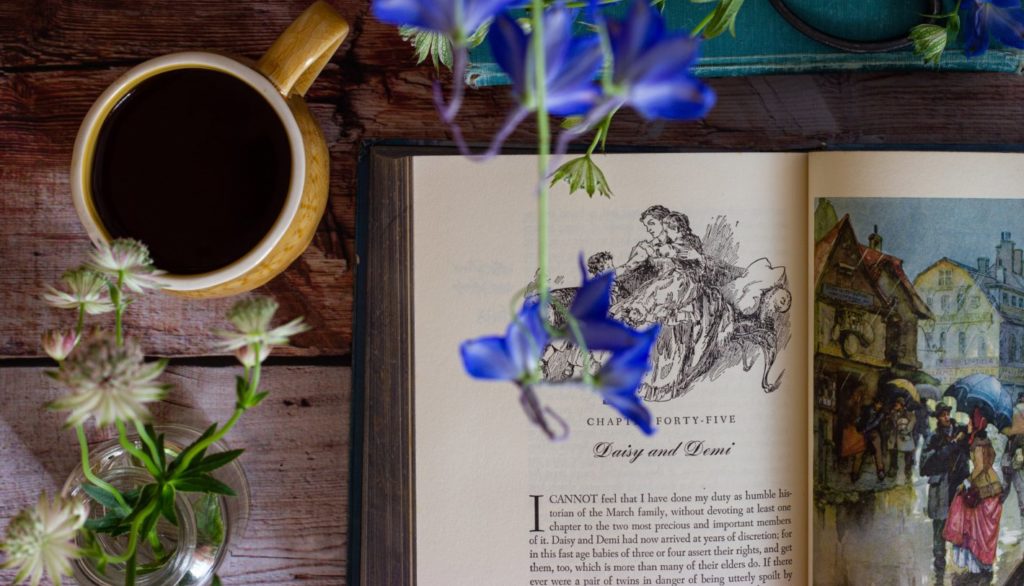The American novelist Louisa May Alcott (1832-1888), who worked hard for the abolition of slavery and for the inclusion of women in the suffrages, narrates with great sensitivity the lives of the four daughters of the March couple (Meg, Jo, Beth and Amy), in the popular Little Women and in its two sequels: Good Wives y Jo's boys (Little Men). It describes the gentle and strong pedagogy of a Christian home, which must face various sufferings and difficulties. Overcoming class prejudices, excesses of temperament, illnesses, separations due to war, as well as economic hardship, the young women become responsible professionals and cultivated wives and mothers.
In turn, the Canadian writer Lucy Maud Montgomery (1874-1942) created the charming figure of Anne Shirley, in the famous novel Ana de Tejas verdes (Anne of Green Gables) and in the seven subsequent books in the series: the orphan girl - adopted by the farm owners named Green shinglesThe story is told in a lively, intelligent, original, impulsive, affectionate and stubborn way by a woman with a great personality, who illuminated the minds and hearts around her with her sharp wit and ardent love. It tells the gripping story of this woman gifted with great personality, who illuminates with her sharp wit and ardent love the minds and hearts around her, and who went on to form a beautiful Christian family with many children and grandchildren.
The genius of women
In these female literary figures we find the embodiment of what John Paul II called the "genius" and "prophetism" of women, which is born of their constitutive openness to the maternity: that is to say, of its vocation to receive, engender, care for and educate incipient, weak and needy human life (cf. apostolic letter Mulieris dignitatem on women's dignity and vocation, 15-8-1988, nn. 29-30; see also: Congregation for the Doctrine of the Faith, Letter on the Collaboration of Men and Women in the Church and in the World, 31-5-2004, III: Actuality of feminine values in the life of society).
In summary, we can consider that the identity and the mission specific to women include these values: their peculiar capacity and intuition to discover with promptness and amazement the unique and sacred value of each person; his or her peculiar gift for host responsibly and affectionately life to understand and live with joy the true human being that is entrusted to him; his ability to understand and live with joy the true order of love and of beauty; his understanding of the original call to the service and free of charge to others; his inner strength and maturity, developed through the perseverance in the achievement of good in the midst of difficulties and hardships; their dedication, tenderness, cordiality and sensitivity, especially for accompany and promote with affection, patience and demand to the specific people in their training spiritual and also in their suffering; his clairvoyant understanding of the language filial, spousal and generative of the human body in their masculinity and femininity, with their different implications in attitudes and human relationships; their experience of the importance of the commitment and the fidelity, experienced and affirmed as a profoundly agreeable requirement in the dealings between people; his wise insight and diligent care to keep in his heart the grateful memory family history and the gifts received; and, finally, its delicate religious sense, with a prompt orientation to the relationship - intimate and trusting (from you to you), obedient and generous - with the revealed God, which allows him to grasp in the vicissitudes and actions of temporal existence the perspective or the transcendent horizon of the eternal life.
Thank you, woman!
John Paul II himself concluded his Letter to women (June 29, 1995), with a heartfelt song of thanksgiving for the gift of women to the world and to every man:
"I thank you, woman-mother, that you become the womb of the human being with the joy and pains of childbirth in a unique experience, which makes you God's smile for the child that comes to birth and makes you the guide of its first steps, support of its growth, point of reference on the subsequent path of life.
I thank you, woman-wife, that you irrevocably unite your destiny to that of a man through a relationship of reciprocal self-giving, at the service of communion and life.
I thank you, woman-daughter and woman-sister, that you bring to the family nucleus and also to the whole of social life the riches of your sensitivity, intuition, generosity and constancy.
I thank you, woman-worker, that you participate in all areas of social, economic, cultural, artistic and political life, through the indispensable contribution you give to the elaboration of a culture capable of reconciling reason and feeling, to a conception of life always open to the sense of "mystery", to the building of economic and political structures richer in humanity.
I thank you, consecrated woman, that following the example of the greatest of women, the Mother of Christ, the Incarnate Word, you open yourself with docility and fidelity to the love of God, helping the Church and all humanity to live for God a "spousal" response, which wonderfully expresses the communion that He wants to establish with His creature.
I thank you, woman, for the very fact of being a woman! With the intuition of your femininity, you enrich our understanding of the world and contribute to the full truth of human relationships".





 Educating: the family's vocation
Educating: the family's vocation





